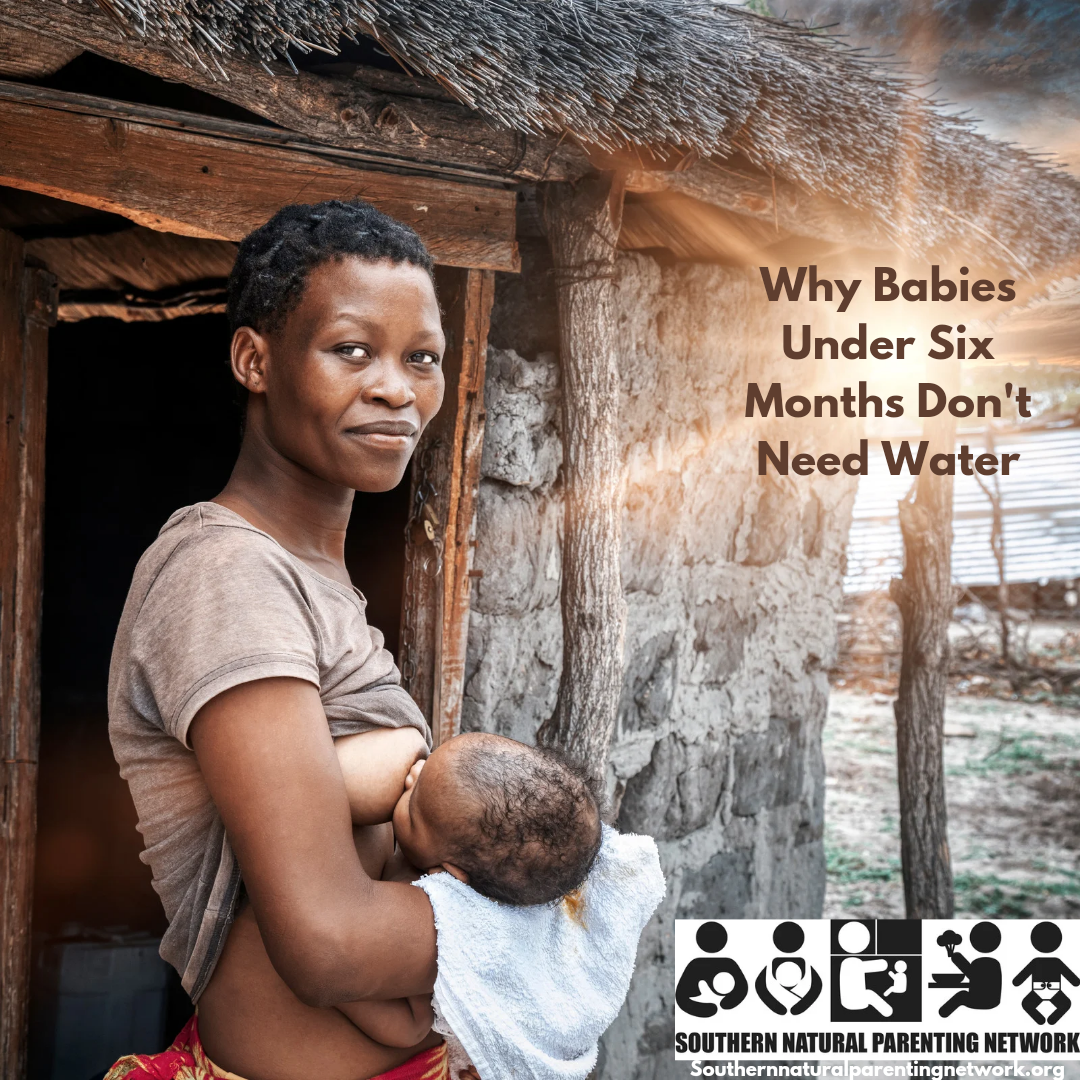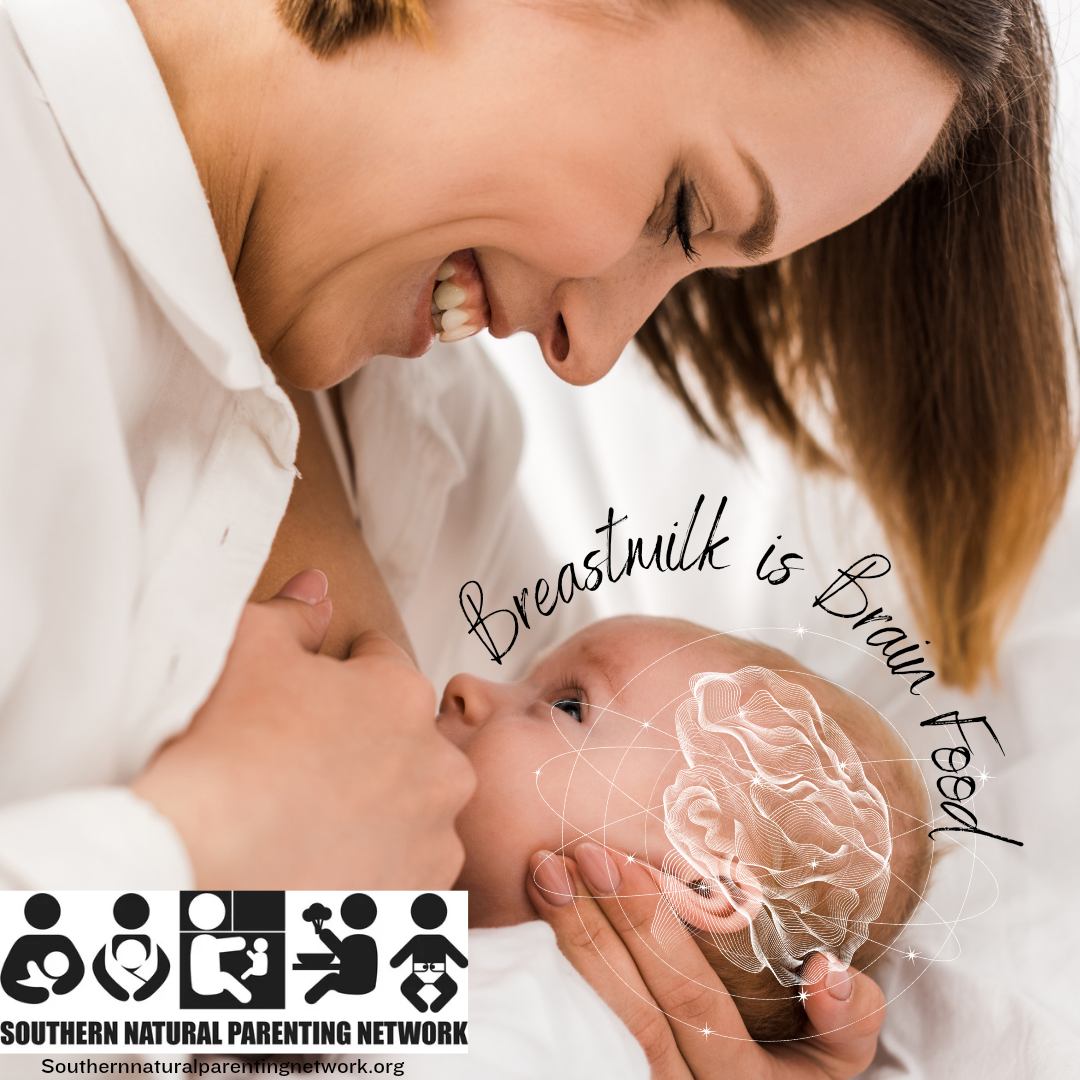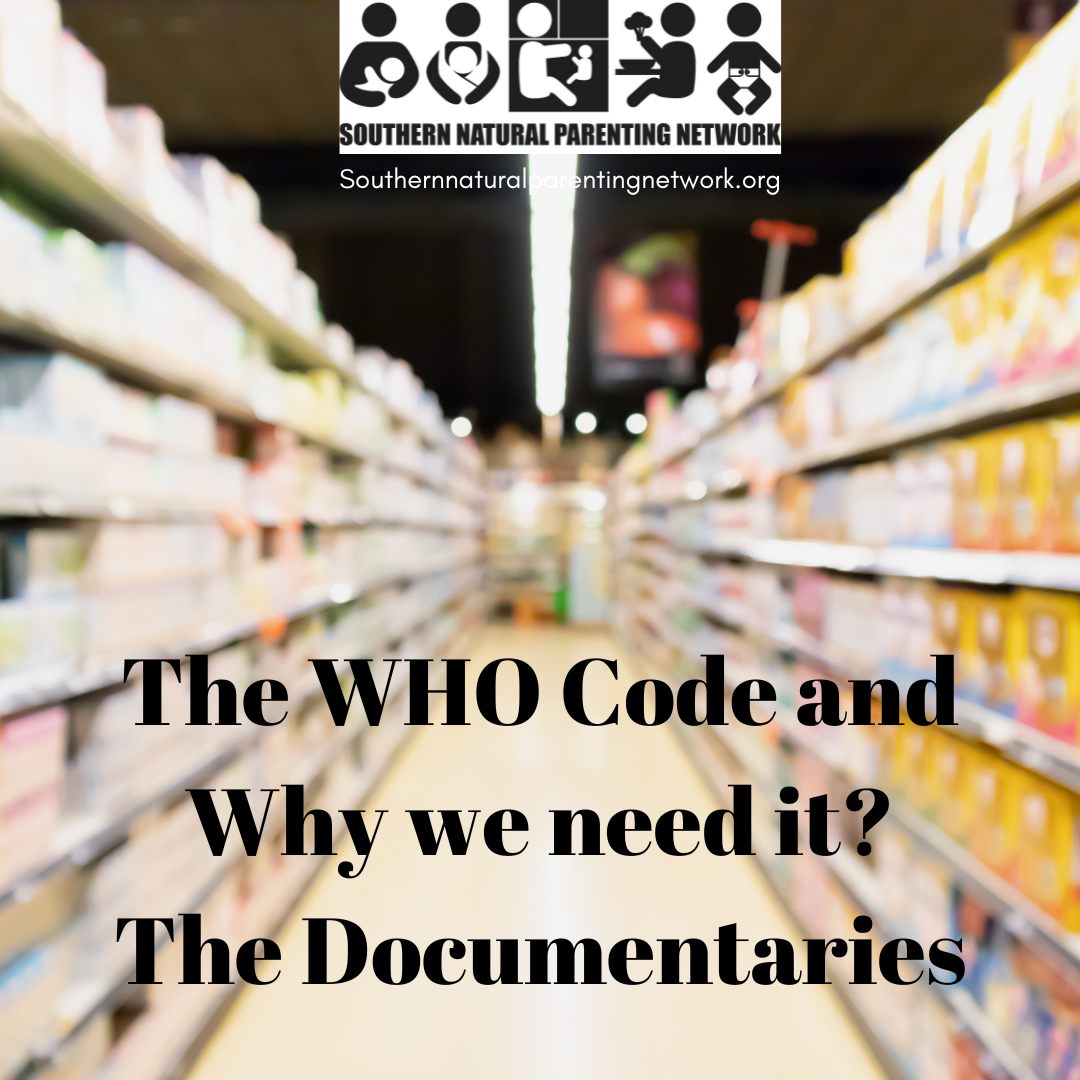See also The Fourth Trimester and Your Baby Week By Week for more information on breastfeeding in the first three months
Breastfeeding
Human infants are breastfed until natural weaning occurs. This is sometimes called full-term or natural-term breastfeeding. We endorse the World Health Guidelines which state:
“WHO and UNICEF recommend that children initiate breastfeeding within the first hour of birth and be exclusively breastfed for the first 6 months of life – meaning no other foods or liquids are provided, including water.
Infants should be breastfed on demand – that is as often as the child wants, day and night. No bottles, teats or pacifiers should be used.
From the age of 6 months, children should begin eating safe and adequate complementary foods while continuing to breastfeed for up to 2 years and beyond.”
— https://www.who.int/health-topics/breastfeeding
When direct breastfeeding is not possible, babies should be fed their own mothers expressed breastmilk and/or donor breastmilk. The use of infant formula is considered a last resort. We do not permit any form of brand promotion of infant formula or products used with breastmilk substitutes in accordance with the The International Code of Marketing of Breastmilk Substitutes, informally known as The WHO Code
We support Informal Milk Sharing through online communities including Human Milk For Human Babies and Eats On Feets. We encourage and support the establishment of human milk banking making human milk available to all babies unable to be fully fed their Mothers Own Milk
We support antenatal expression of colostrum and the use of this in the postnatal period in circumstances where babies need supplementation.
We support relactation and induced lactation. We consider the terminology “breast”, “breastmilk” and “breastfeeding” to be biologically accurate at a population level but respect the right of individuals to use terminology like “chestfeeding”.
We recognise the Australian Infant Feeding Guidelines Information for health workers
“In Australia, it is recommended that infants be exclusively breastfed until around 6 months of age when solid foods are introduced. It is further recommended that breastfeeding be continued until 12 months of age
and beyond, for as long as the mother and child desire. ”
— https://www.eatforhealth.gov.au/sites/default/files/files/the_guidelines/n56b_infant_feeding_summary_130808.pdf
We respect child-led weaning from the breast as optimal but recognise that circumstance may led to mother-led weaning after two years.
We do not support night weaning or adult-modification of infant sleep patterns and recognise the normality and benefit of nighttime breastfeeding throughout the early years of life.
While we recognise that the majority of mothers in Australia initiate breastfeeding but only a minority achieve 6 months of exclusive breastfeeding due to circumstances beyond their control, this is not a community for those who choose not to breastfeed for non-medical reasons. This is not a formula feeding support forum. Questions around choosing and using infant formula are not permitted. We choose to describe the risks of infant formula and/or lack of breastfeeding, which may cause distress.
What to do if your breasts are sore or swollen
Often referred to as blocked or plugged ducts, inflammation of the breast can occur at any stage of your breastfeeding journey. When breasts become over-full due to delayed breastfeeds or pumping, when feeding patterns change suddenly or when outside pressure from tight clothing etc, swelling can happen inside the breast tissue.
How we refer to this common condition and the best management of it has changed recently, with better understanding of how breasts make and store milk leading to new guidelines globally. So let's look at what you need to know.
Language to describe the changes in the breast has been refined to be more accurate.
Losing Your Milk Supply
You have probably heard of mothers losing their milk. You might even have been told it happened - or is happening - to you. You might be surprised then to learn the following facts:
The Price of NOT Breastfeeding
Right now, in the UK, families are facing the cost of living crisis in its harshest form. The cost of infant formula has increased by around 25% in the past two years. Parents are left with the choice to put infant feeding costs ahead of other expenses like housing or utilities or - the most dangerous option - water down their baby’s milk feeds or use non-recommended alternatives.
This situation is not new - it has played out around the globe for decades - but in the UK and other western countries, the impact is hitting higher up the socio-economic ladder than before and questions are being asked.
Breastfeeding: Expectations versus Reality
Breastfeeding. It's natural. Humans have been doing it since the dawn of time. How hard could it be?
So. Hard. Sometimes.
Most mothers and babies take time to get breastfeeding established. Now, you might expect this to mean days but it means weeks. Just because it's natural doesn't mean it comes naturally to everyone: mothers and babies.
Learning to breastfeed is like learning to dance. It is a partnership where two people need to independently do their bit, then combine their parts together. And, like dancing, there is a lot of getting in each other's way.
Why babies under six months do not need water
In the past, when babies were fed strictly four-hourly, mothers were sometimes advised to offer boiled water if the baby was “unsettled” between feeds. Unfortunately, these babies were hungry and showing feeding cues and needed to go to the breast. Filling their tummy with warm water made them think they had been fed but they had received no calories or nutrition and were soon hungry again.
Boiled water was also suggested to bring up wind in unsettled babies. This was totally without evidence and might calm a baby signalling for more time on the breast than the clock allowed, perhaps even leading them to burp the air they swallowed from sucking at a bottle.
However, it is no longer recommended to give young babies water at all.
Both breast milk and infant formula contain the fluid babies require. Additional fluid can stress their system and even lead to water overload in extreme cases, where the kidneys struggle to process the extra fluid and natural electrolytes can become unbalanced.
In hot weather, some people worry that babies need water as well as milk. This is not the case. Breastmilk is 87% water and infant formula is around 85%. A baby who is thirsty will show feeding cues seek the breast, often for short feeds more often. Even formula fed babies can be offered extra feeds during hot weather.
Human babies survive around the world without bottles of water, as do all the other primates and mammals!
How will we feed the babies?
As our world evolves over coming decades, facing climate change, global unrest, vulnerable supply chains and uncertain economies - has anyone asked this question?
The obvious answer is breastfeeding but it is not as straightforward as that. Increasingly, babies are being mixed-fed - breastfeeding and/or expressed milk plus infant formula. Many are exclusively formula fed before they are 6 months old.
This is not about your personal choices or circumstances: we are considering the options and challenges parents in the coming decades will have.
Breastmilk is Brain Food
Many parents track their babies progress on charts which record the rapid weight gain in the first year of life. They use this data as a scale of breastfeeding success: high weight gain = good milk supply, low weight gain = poor milk supply. And they also use the clock to determine how well breastfeeding is going: long periods of sleep between breasts equals good supply, short periods of sleep equals poor supply. Even though that isn’t how it works.
This obsession with numbers is a modern construct entirely influenced by the infant formula industry in the 20th century and entirely overlooks the most important role of human milk in infant growth.
While babies need the basics they can get from infant formula: protein, carbohydrates, fat, vitamins and minerals - it is the less well-known components of human breastmilk which are uniquely suited to developing a human brain.
Do you still need to top up?
Many babies leave hospital receiving complementary feeds - comps - of infant formula, used to “ top up” after breastfeeding. Usually this is because the baby has lost more weight than desirable and has yet to begin gaining weight. Up to 10% of birth weight is acceptable but beyond this doctors and nurses will routinely recommend topping up with expressed breastmilk and/or infant formula. This begins around the same stage as discharge from hospital and the mother will go home with instructions to pump after every breastfeed, give the expressed milk to the baby plus formula so the combined total meets the recommended amount. This is often called “triple feeding”.
Breastfeeding and the Infant Immune System
Many parents want their baby to be breastfed because of the recognised protection it offers the immature immune system. Yet most people have little understanding of what this protection is or how it works.
Do you need to worry about Foremilk and Hindmilk?
Research had shown how the balance of fat and volume in human milk changes as a feed progresses. Words to describe the process were created: Foremilk to describe the milk at the beginning of a feed and Hindmilk to describe the milk later in a feed.
To avoid babies being swapped from the first breast before they were ready, mothers were now advised to “Finish the First Breast First”. Rather than following the clock, following the baby recognised the unique way individual babies feed. The second breast was to be offered but if the baby indicated they were satisfied, the feed was concluded and the next feed would begin on the alternate starting breast.
How the western world almost stopped breastfeeding
It is hard to think of any other natural human behaviour which has come as close to extinction as breastfeeding did in the 20th century.
Although commercial infant foods were developed in the late 1800s and were being promoted prior to the first world war, it was after the second global conflict when their use became so widespread that it led to a recognised decline in breastfeeding.
Breastfeeding Support Organisations
Around the world, the importance of mother to mother support for breastfeeding women has been proven over decades. The growth of grass- roots advocacy and support runs parallel to increasing breastfeeding rates in those communities.
In 1956, mothers in Chicago USA came together to create what would become the Le Leche League International (LLLI). Nearly 70 years later, LLLI has a global presence with chapters around the world providing peer support, resources and information to mothers.
Across the Pacific, another group of mothers were inspired by LLLI and established the Nursing Mothers Association in early 1964. Later the Nursing Mothers Association of Australia, NMAA quickly grew with branches across the country and a network of local groups. In 2001, the organisation changed its name to the Australian Breastfeeding Association (ABA). Almost 60 years later, ABA continues to offer evidence based support through a range of services to parents Australia-wide.
Why newborn babies lose weight - and why 10% matters
It is routine for newborn babies to be weighed soon after birth. This is not just to inform the happy family and friends but o give a baseline for ongoing recording. Weighing and measuring should wait until the baby has had uninterrupted skin to skin contact and the first breastfeed in the hours after the birth.
All full-term babies are born over-hydrated. Floating around in amniotic fluid in the womb, which they sip and swallow as well as absorb through the skin, this extra hydration supports the concentrated colostrum which is the first milk babies receive from the breast. As they process and excrete this extra fluid, babies lose weight in the first week of life which is typical and expected. Up to 7% of birth weight is considered normal but many babies lose as much as 10% - the point where medical staff will usually recommend the following protocol:
Why hospitals should have a clear breastfeeding policy
The management of breastfeeding and lactation is constantly evolving as research informs updated guidelines. When health care facilities clearly communicate best current practice to staff and patients, parents can be confident they are getting the best support as they establish and maintain breastfeeding.
Personal experience and opinion have no place in breastfeeding support. When staff are held accountable to clear policy and procedures, there can be no confusion.
A breastfeeding policy should reflect the World Health Organization and UNICEF Baby-Friendly Hospital Initiative Ten Steps to Successful Breastfeeding.
Rooming-in: Keeping newborns and mothers together
Most hospitals no longer have nurseries for well babies
It's a familiar sight in American movies and TV shows: rows of newborn babies lined up in cots behind a viewing window. But it's not something you will see in countries like Australia and it hasn't been for decades!
The WHO Code and Why we need it?
Since the 1970s, global concern about the marketing tactics of infant formula manufacturers has led to action to regulate the industry.
The World Health Organization and UNICEF adopted the International Code on Marketing of Breastmilk Substitutes in 1981. More than 40 years later, some countries have fully embraced the Code in Law, while others- most significantly the US - have refused to implement the Code in any way: one of just four countries globally. You can see the most recent list of compliance by country here
Breastfeeding Documentaries
Advocacy for breastfeeding comes in many forms. One often overlooked is the format of film and documentary, yet these can give unique insight into the barriers and benefits of protecting breastfeeding globally.
Here are some of the best. Most can be found on streaming services.
Breastfeeding In Public: Promotion and Campaigns
Efforts by advocacy groups and governments around the world to change community perception about breastfeeding in public have used some creative means. We have gathered together some of the best here:
Breastfeeding in Public: A Timeline
Breastfeeding a baby in public has never been illegal. It was just unprotected. People could tell mothers they weren't “allowed” to breastfeed their babies in various spaces outside their home and women had to accept it. Until they didn't.
In Australia, protection for breastfeeding was included under State and Federal Anti-discrimination Acts. Women around the country lobbied their parliaments to specifically include breastfeeding, which they did, using a variety of descriptions.
You would expect this collectively brought an end to any confusion but incidents of discrimination continue to appear in the media and in the day to day lives of families. The common theme is that it is breaking some presumed rule or law or is somehow inappropriate or dangerous for the baby.
Babies breastfeed a lot. Like, really a lot! Condemning mothers to only breastfeed at home or is designated spaces is impractical and discrimination. Babies get to #eatinpublic, just like children and adults.
Since the 1980s, I have followed media coverage of breastfeeding in public here in Australia and overseas. The stories tend to come in similar installments:
The outrage
The apology
The opinions
The protest
For some reason, the second point rarely gets the coverage the others do and so the message retained by the masses is "the mother was wrong" - even when relevant laws, company policies and other facts are highlighted.
Here I have gathered some key stories:




















